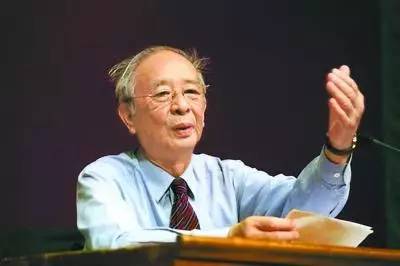If a person is not willing to be ordinary ordinary, naturally to bear suffering, so there is a Chinese saying that born in trouble, died in peace.
如果一个人不甘于平庸凡俗,自然要担当起苦难,所以中国有所谓“生于忧患,死于安乐”的说法。

Tang Yijie (1927–2014) was a contemporary Chinese philosopher and master of Chinese traditional culture. He served as Professor and Doctoral Supervisor in the Department of Philosophy at Peking University, and as a Member of the Central Research Institute of Culture and History. He held leadership positions including Director of the China Academy of Chinese Culture, Consultant for the Chinese Association for the History of Philosophy, Vice President of the Chinese Confucian Association, Council Member of the International Society for Value Inquiry and Philosophical Research, Consultant for the International Confucian Association, and Vice Chairman of the International Taoist Association. From 2003 onward, he served as Director and Chief Expert of the Confucian Canon (Ru Zang) Compilation Center. His representative works include Guo Xiang and Metaphysics in the Wei and Jin Dynasties, History of Early Taoism, Confucianism, Taoism, and Buddhism in Traditional Chinese Culture, and Buddhism and Chinese Culture。
汤一介 (1927—2014),中国当代哲学家、国学大师,曾任北京大学哲学系教授、博士生导师、中央文史研究馆馆员;中国文化书院院长、中国哲学史学会顾问、中华孔子学会副会长、国际价值与哲学研究会理事,国际儒学联合会顾问、国际道学联合会副主席;2003年起担任《儒藏》编纂中心主任、首席专家;代表作品:《郭象与魏晋玄学》《早期道教史》《中国传统文化中的儒道释》《佛教与中国文化》等。
“My family upbringing undoubtedly had a profound influence on the formation of my character. My father was a professor who studied in the United States, earning his master’s degree from Harvard University, and taught at university throughout his career. He lectured on Chinese, Western, and Indian philosophy. He was a scholar dedicated to studying the history of Chinese Buddhism, yet in his personal conduct and handling of affairs, he embodied a distinct Confucian spirit. This was likely influenced by my grandfather.
My grandfather attained the rank of Jinshi (Metropolitan Graduate) in the 16th year of the Guangxu Emperor’s reign during the Qing Dynasty. He served several terms as a county magistrate and later frequently held the post of local examiner for the civil service examinations. My grandfather consistently upheld the maxim, ‘shrink from no difficulty in affairs; evade no responsibility demanded by righteousness; act according to one’s position; be content and at ease wherever one finds oneself’ , as the guiding principle of his life and conduct.
As for my father, as Mr. Qian Mu noted in his piece Remembering Xiyu , ‘Xiyu (my father’s name was Tang Yongtong, courtesy name Xiyu ) was a man of perfect harmony’ . ‘He honored his elders and cherished the young; his household was harmonious and amiable; in eating, drinking, rising, resting, advancing, and retiring, he was truly a model Confucian scholar’